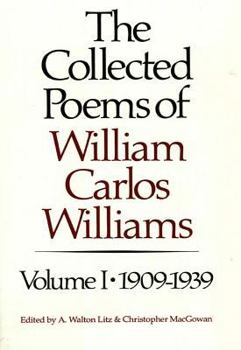The Collected Poems of William Carlos Williams: 1909-1939
Select Format
Select Condition 
Book Overview
So that readers could more fully understand the extent of Williams' radical simplicity, all of his published poetry, excluding Paterson, was reissued in two definite volumes, of which this is the first.
Format:Paperback
Language:English
ISBN:0811211878
ISBN13:9780811211871
Release Date:September 1991
Publisher:New Directions Publishing Corporation
Length:608 Pages
Weight:1.03 lbs.
Dimensions:1.2" x 6.0" x 8.9"
Related Subjects
PoetryCustomer Reviews
4 ratings
All together-- the poems are even better
Published by Thriftbooks.com User , 19 years ago
I'm not going to attempt to talk about WCW's poetry or I could be writing for hours... rather this review is about the volume of "collected" poems as a book to read. Yes it includes some dubious items and some debris we would expect from any serious and innovative writer... but there are mostly successes here and well worth reading. Especially informative is observing WCW's development as a writer and thinker and his daring as a poet and his striving for new ways to express the response of an artist to the swelling tide of modernity and cultural failures of the 20th century.
Intense Words and Feelings
Published by Thriftbooks.com User , 22 years ago
How can one describe William Carlos Williams, a great brilliant writer. His words are so in depth and so meaning and can relate to any particular situation one might be in. His use of language is superior above others. Not until recently did I read something of his in a collection of poems that I had borrowed, and I saw one poem that stuck out to me. This poem is called Romance Moderne. This is a truly excellent poem and led me to be such a great admirer of William Carlos Williams. I've borrowed his collection of poems almost a thousand times from the library, and I still haven't finished reading all of his poems. It takes a necessary amount of time to soak in his words, and with such a great number of poems, I'd like to soak them all in, thus I will be buying the book for myself to have.
The foundation of WCW's art
Published by Thriftbooks.com User , 24 years ago
Whew, check out that list. This is the foundation of Williams' art, for fans of his selected & Pictures from Brughel. This is the development of Williams' daily art, fine poems punctuated by an occasional masterpiece or near-surrealistic gemstone. Someone once asked John Cage, "With your methods, couldn't anyone compose music?" Cage replied, "Yes, but they don't." With Williams, it almost seems that everyone did, by the 1950s. Williams was better at setting examples than at explaining methods. He learned & invented as he wrote, & I suspect his talk & his letters had a great deal more influence than his occasional stabs at poetics. Williams stripped down American poesy & reconstructed it as a form of talk, which it had been all along beneath Whitman's yawping & Dickinson's obsessive editing & Frost hiking though New England snow five steps at a time. Like all great American originals, he didn't know he was supposed to be a somebody-else; maybe a Stephen Benet, a William Vaughn Moody, an Edwin Arlington Robinson, all big literary stars in their time but not now counted in the first ranks of our poets. This is roughly the first half of The Doc's amazin' journey. You'll know if you need it. Any intelligent poet friend will love it as a gift.
Intense
Published by Thriftbooks.com User , 25 years ago
The overall strength of Williams' work lies in his power to summon image from where there was previously nothing. Forget about the conventional tactics of poetry (meter, rhyme, etc.). Williams effectively occupies the outer regions of the land which is not prose. His power always properly lay in the simple yet vivid images (visual, aural, tactile, etc.) behind the words.





